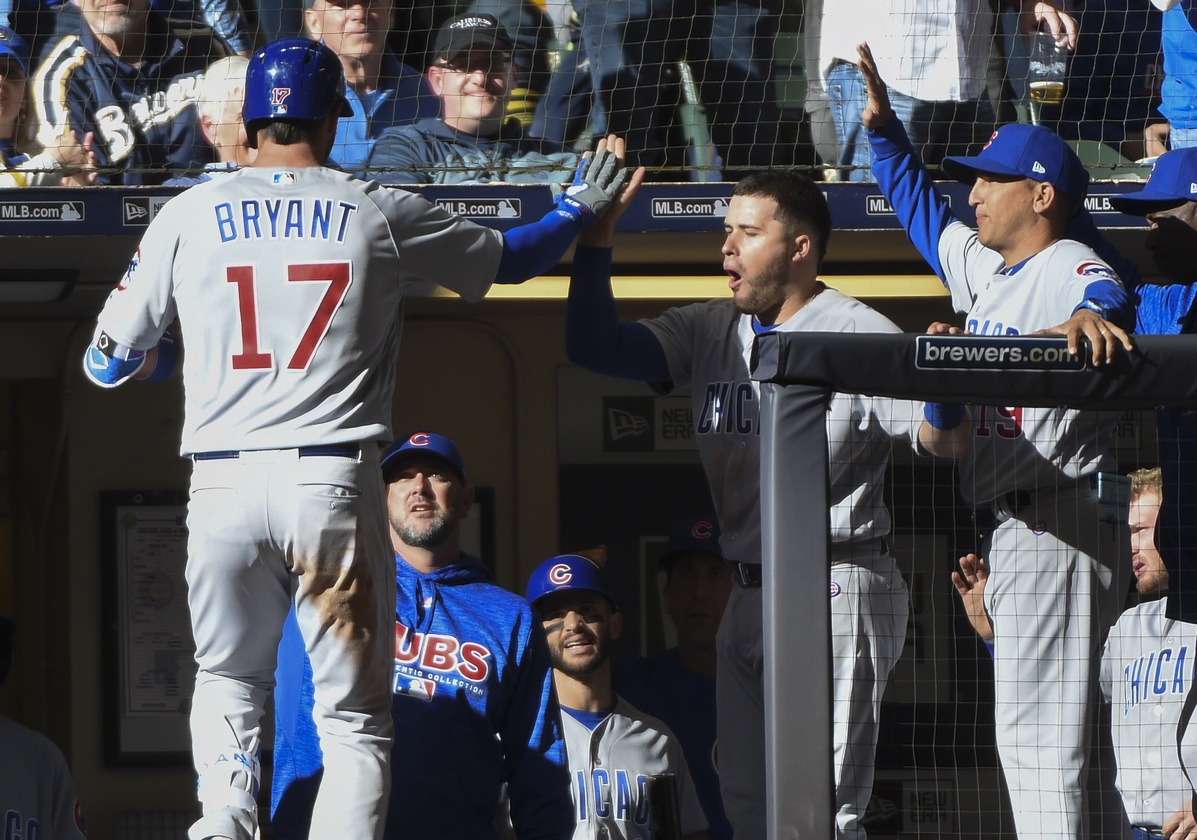What You Need to Know
After the Cubs’ late-game, defensive breakdown last night, the Brewers had a breakdown of their own. Two errors in the ninth allowed the Cubs to come back for four runs, though Chicago only hit one ball out of the infield in the inning. Yu Darvish was excellent, and Kris Bryant never failed to reach base.
Next Level
Just as it’s silly to freak out over a bad start in his Cubs debut, it’s equally silly to look at Darvish’s success today and say that his troubles are over. It’s also silly to look at a pitcher struggle over three starts stretched across six months and say he was struggling, even if two of those games came in the World Series, but this is the narrative that’s been created around Yu Darvish. He was great, then he was bad when it mattered most, then he was bad at the start of the season. But now he’s great again and he’ll continue to be great until he’s bad again. Which might be his next start. But it might not be until the Cubs are playing the Angels in the 2018 World Series.
That was a roundabout way of saying that Darvish looked really good today. Though his first inning induced some collar tugging, he made it through six innings with nine strikeouts and just one walk. His fastball velocity was up and his offspeed pitches looked much sharper. He made a few mistakes on which the Brewers weren’t able to capitalize. His inability to throw a low fastball for a strike first time through the order nearly led to some early runs for the Brewers. Darvish, though, escaped the first unscathed when Travis Shaw popped up a pitch that looked an awful lot like the slider Derek Dietrich swatted over the wall in Miami.
The second and third times through the order, Darvish was the pitcher the Cubs were hoping to get. He got plenty of whiffs with the slider and he kept hitters off balance by mixing in his curve more. Even the pitch that Thames hit for a home run wasn’t terrible. The slider to Shaw was probably worse. Sometimes decent pitches get hit over the fence and sometimes mistakes get popped up, but when you’re pitching like Darvish was, the latter is likelier.
Meanwhile, every member of the Cubs’ lineup not named Kris Bryant seemed determined to waste Darvish’s effectiveness. Kris Bryant was the only Cub to reach base until Tommy LaStella’s single in the fifth. It took a great defensive play (and a close call at the plate) to stop LaStella from scoring. Not even a rare Javier Baez walk to load the bases with less than two outs could bring a run home.
It’s perhaps unfair to zero in on one player when a whole team isn’t hitting, but I’m going to zero in on Ian Happ anyway. He was, after all, the guy at the plate who ended Chicago’s rally in the fifth. After hitting a dinger on the first pitch of the season, Happ has gone 4-for-27 with 17 strikeouts. It’s possible after such a successful spring, he’s been over anxious to make something happen at the plate. His strikeout in the third and his popup in the fifth both came on cutters out of the zone. His o-swing% is up to 43.5 percent and his overall swing rate is up 5 percent. Small sample size, sure, but Happ isn’t going to turn things around until he stops chasing bad pitches.
Of course, I wrote the above paragraph before Happ got the game-winning hit, but my point still stands.
Top WPA Play
I’m glad it was Happ that got the game-winning hit, though. I have been, and will always be, an Ian Happ guy. It looked like the Brewers were trying to go inside with another cutter like the one Happ popped up on with the bases loaded earlier in the game. Jacob Barnes didn’t get it far enough inside though, and Happ was able to punch it over Arcia’s head at shortstop. (+.252)
Bottom WPA Play
Objectively, Kris Bryant’s triple in the eighth inning is why 3 p.m. starts are good. The weird shadows add another layer of complexity and chaos to the otherwise predictable game of baseball. If this game had started at 1 p.m. or 7 p.m., Lorenzo Cain has a much better chance to catch this baseball, depriving viewers the rare thrill of a triple.
Objectively, Eric Sogard’s double in the sixth is why 3 p.m. starts are bad. The weird shadows probably added another unnecessary level of difficulty (even if there weren’t shadows on the field) to an already chaotic sport. If this game had started at 1 p.m. or 7 p.m., Jason Heyward, an otherwise elite defender, has a much better chance to catch this ball, providing viewers with the even-keeled excitement of an outfielder catching a ball at the warning track. Also, 5:45 is when Heyward should be kicking off his shoes after a hard day’s work, not chasing down a fly ball in deep right-center. He certainly looked sleepy trying to get under that ball. (-.166)
Lead photo courtesy Benny Sieu—USA Today Sports
